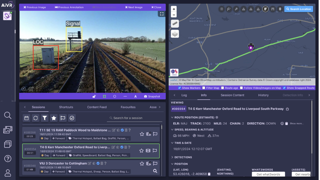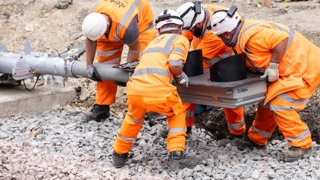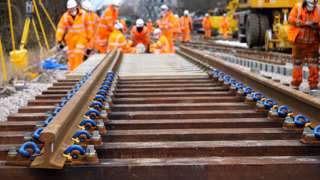The result came barely 90 minutes after the ballot closed. RMT members working for Network Rail had overwhelmingly accepted their pay offer and so closed a dispute that’s lasted for a year.
The result was impressive, with 12,000 voting for the deal and 3,700 voting against. Compare that with last December’s result of 5,600 voting for and 9,700 against.
So, what changed to cause this switch in numbers? In pay terms it was still 5% for 2022 and 4% for 2023, but the date for 2023’s increase was pushed back from April 2023 to October 2022, which gave staff a little bit more money. Network Rail also separated its ‘modernising maintenance’ reforms from the deal, to proceed with them separately.
The RMT paints this as a victory. The pay deal is certainly better than the 2% plus 2% initially offered last spring. But the union has not stopped the maintenance changes which it denounced just in February as “a recipe for disaster” that would “lead to a crisis in the safety for our railways and an increased risk of derailments”.
Announcing its win, the union said it would “continue to scrutinise and challenge, including on safety” NR’s modernising maintenance plans. In rhetorical terms, that’s quite a climbdown. I welcome the deal, but hope the continuing disagreements about modernisation do not sow the seeds of the next dispute.
Within a few days of its Network Rail vote, RMT leaders suspended strikes in their dispute with train operators working to Department for Transport contracts.
As this issue of RAIL goes to press, the union has not said whether it will take the Rail Delivery Group’s current offer to a vote. This offer hasn’t changed since the union’s national executive rejected it, so something needs to alter to give the RMT executive space to change its view and allow its members to vote.
That change could be the messaging around using a ‘dispute resolution process’ to find agreement. Writing to members on March 23, RMT General Secretary Mick Lynch described the proposal letter from RDG as an offer: “What is being proposed is that, if we do agree to enter the DRP, our members would be paid the stage one pay increment which is 5% or £1750, whichever is the greater, on salaries with backpay to the 2022 pay anniversary.”
The RDG’s letter said it was a “summary of our discussions to date”. That’s not the same as an offer, but the letter does explain what the operators want to talk about.
There’s another passage that might differ from RMT’s interpretation. Talking about the first year pay rise, the RDG writes that it “will be paid upon the Dispute Resolution Process document being adopted by the RMT”.
Whether ‘adoption’ means the RMT entering the process or completing it with a deal on which members can vote seems open to wider interpretation.
Perhaps I’m overthinking this, but I’m certain there’s more talking to be done about RDG’s ambition to introduce a new multi-skilled grade at stations - ticket office closures by another name.
The obvious way forward is to split out the proposed changes to ticket offices just as NR split out maintenance modernisation. As one manager put it: “Network Rail took reforms out without taking reforms out. Stations don’t need to be in the deal - they can be done without trade union agreement.”
“Above all, rail needs to be boring… it must run its timetable reliably, day-in and day-out.”
That’s because the blunt truth remains that train operators can consult on ticket office changes and implement them. The bitter pill is that this could lead to redundancies. The alternative is the creation of those multi-skill roles for station staff, with help to find other railway jobs for anyone without a station role.
But separating ticket office changes from the pay deal allows the RMT and its members a way forward. They can claim to have seen off the changes even as train operators continue with them. Yes, there’s a sleight of hand, but that’s what opened the way to the acceptance of Network Rail’s offer.
Solving the RMT’s dispute with DfT train operators just leaves ASLEF’s drivers at odds with the employers. ASLEF was later into the dispute and made a lot of noise before Christmas. More recently, things have become quiet. That’s generally a good sign.
At the risk of counting chickens, let’s look beyond the end of these strikes. How does rail now recover public trust and confidence?
Above all, rail needs to be boring. By that, I mean that it must run its timetable reliably, day-in and day-out. Punctuality and reliability remain the bedrock of a successful railway.
Fares can follow, but rail will not be viewed as good value, however cheap or not fares might be, until passengers trust their train to appear at the right time and deposit them on-time at their destination.
Hard on the heels of punctuality and reliability comes capacity. That’s either trains frequent enough to meet demand, or long enough. Here, I have grave doubts about the wisdom of withdrawing stock such as CrossCountry’s High Speed Trains.
Behind boring reliability must sit good relations with railway staff. This will not be easy for anyone after almost a year of industrial unrest. For companies such as Trans Pennine Express, it will be even harder. It has the unwelcome claim to being Britain’s worst train operator, with recent statistics from the Office of Rail and Road showing it cancelled nearly a quarter of its services in February, with lack of available train crew a real problem.
From what I can see, TPE’s problem is most acute with drivers’ union ASLEF. Their disagreement dates to the early days of COVID-19, almost exactly three years ago. As one source close to the union commented to me: “They ****ed us over COVID, we’re ****ing them now.”
This goes a long way to explaining why ASLEF is so vehemently against helping TPE by agreeing a rest day working agreement. The company needs it to help train drivers, particularly for route competency. Without sufficient drivers ‘signing the road’, the company struggles to deliver its timetable, hence the many cancellations.
In turn, the cancellations let the union claim the company doesn’t employ enough drivers. ASLEF also points to the numbers leaving. TPE counters that drivers are leaving for other operators who offer overtime and rest day working which boost wages.
This has all the hallmarks of a disagreement that needs some heads knocking together. It’s not in passenger interests for company and union to be arguing like this. Both sides need to co-operate to develop rosters and diagrams that slowly rebuild TPE’s reputation and the wider reputation of rail in northern England.
I hope that ASLEF is not engaged in a fight simply to eject FirstGroup as TPE’s owner and force the DfT to step in as Operator of Last Resort. That sounds more like a vendetta than the normal and acceptable cut and thrust of relationships between staff and employers. For passengers’ sake, let’s see this and the other disputes put behind us, so that rail canrecover.
WHAT’S YOUR VIEW?
Email: [email protected]
To read all our magazine articles, choose from either a Digital Edition Membership from just 99p for your first month, or a Print & Digital Edition package from just £9.50 per month. Choose your Membership here
















Login to comment
Comments
No comments have been made yet.